中考英语语法复习 一般现在时
中考英语考点梳理:一般现在时语法详解!

一.一般现在时有三种形式1. 谓语是be(am/is/are)的一般现在时。
①肯定形式:主语+be+表语(形容词、名词充当表语)。
I am hungry.You are beautiful.He is a doctor.②否定形式:主语+be+not+表语(形容词、名词充当表语)。
I am not hungry.You aren't beautiful.He isn't a doctor.③一般疑问句形式:Be+主语+表语(形容词、名词充当表语)?肯定回答:Yes,主语+be. 否定回答:No, 主语+ be+not.—Are you hungry?—Yes,I am./No,I'm not.—Is he a doctor?—Yes, he is./No, he isn,t.④特殊疑问句形式:特殊疑问词+Be开头的一般疑问句?—What is he?—He is a doctor.注意:be要随着主语变。
2. 谓语动词是实义动词(及物动词或不及物动词)的一般现在时。
①肯定形式:“主语+及物动词+宾语”或“主语+不及物动词”。
She has a little brother.她有一个弟弟。
The sun rises in the east.太阳从东方升起。
②否定形式:“主语+don't/doesn't+及物动词+宾语”或“主语+don't/doesn't+不及物动词”。
She doesn't have a little brother.她没有弟弟。
I don't eat every morning.我每天早晨都不吃饭。
③一般疑问句形式:“Do/Does+主语+及物动词原形+宾语”或“Do/Does+主语+不及物动词原形”。
肯定回答:Yes,主语+do/does. 否定回答是:No, 主语+ don't/doesn't.—Do you eat every morning?—Yes, I do./No, I don't.—Does she have a little brother?—Yes, she does./No, she doesn't.④特殊疑问句:特殊疑问词+do/does开头的一般疑问句?What do you like?When do you go to school?注意:根据主语确定用do还是does。
中考语法重点梳理总结
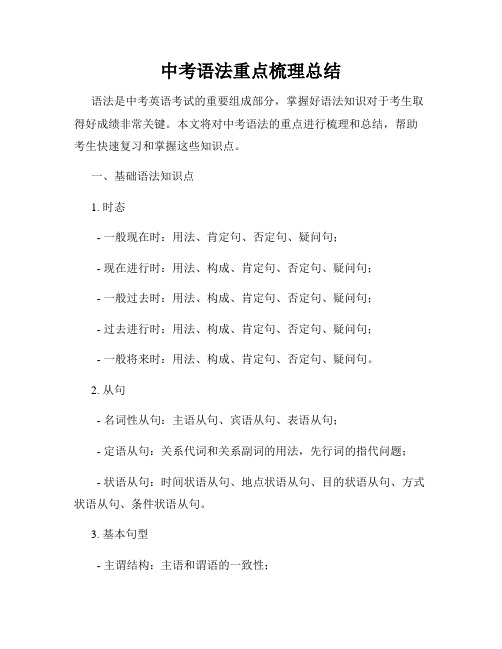
中考语法重点梳理总结语法是中考英语考试的重要组成部分,掌握好语法知识对于考生取得好成绩非常关键。
本文将对中考语法的重点进行梳理和总结,帮助考生快速复习和掌握这些知识点。
一、基础语法知识点1. 时态- 一般现在时:用法、肯定句、否定句、疑问句;- 现在进行时:用法、构成、肯定句、否定句、疑问句;- 一般过去时:用法、构成、肯定句、否定句、疑问句;- 过去进行时:用法、构成、肯定句、否定句、疑问句;- 一般将来时:用法、构成、肯定句、否定句、疑问句。
2. 从句- 名词性从句:主语从句、宾语从句、表语从句;- 定语从句:关系代词和关系副词的用法,先行词的指代问题;- 状语从句:时间状语从句、地点状语从句、目的状语从句、方式状语从句、条件状语从句。
3. 基本句型- 主谓结构:主语和谓语的一致性;- 主谓宾结构:动宾搭配、及物动词和不及物动词; - 主系表结构:系动词的用法、表语的形式。
二、常见错误类型及纠正方法1. 词性错误- 形容词和副词的用法区别;- 名词和动词的转化。
2. 时态错误- 部分考生容易混淆不同时态的用法;- 注意句子的上下文语境,选择正确的时态。
3. 代词错误- 指代不明确,造成语义模糊;- 注意先行词和代词在语法和逻辑上的一致性。
4. 介词错误- 介词搭配的固定搭配用法;- 注意特殊动词和介词的搭配。
三、复合句的连接词1. 并列连接词- and, but, or, so等的用法和区别;- 注意使用上的逻辑连贯和前后句之间的平衡。
2. 引导性连接词- because, if, when, while等的用法;- 注意从句与主句之间的逻辑关系。
3. 状语连接词- before, after, since等的用法;- 理解并正确运用时间、地点和条件等状语从句。
四、易混淆的语法知识点1. 动词时态和语态的区别;2. 定语从句和状语从句的区别;3. 直接引语和间接引语的句式转换。
五、巩固方法与技巧1. 多做语法练习题,掌握各类语法知识的运用;2. 利用语法书籍和教辅材料进行针对性的学习;3. 多听、多读、多写,培养语感和理解能力。
初中英语2024届中考语法复习一般现在时和一般将来时知识讲解
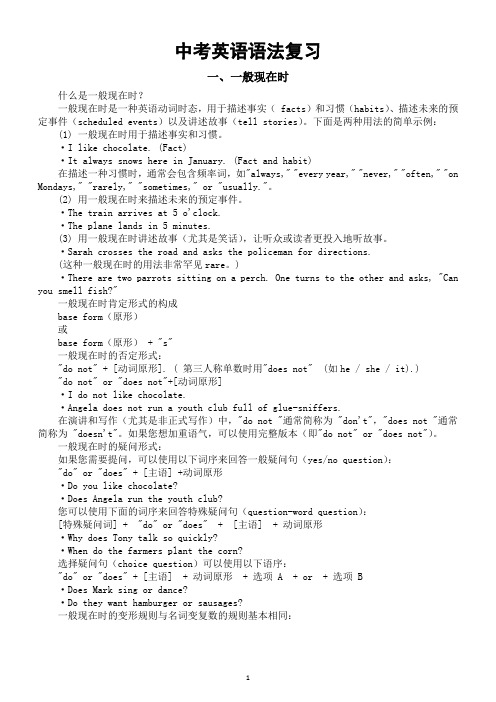
中考英语语法复习一、一般现在时什么是一般现在时?一般现在时是一种英语动词时态,用于描述事实( facts)和习惯(habits)、描述未来的预定事件(scheduled events)以及讲述故事(tell stories)。
下面是两种用法的简单示例:(1) 一般现在时用于描述事实和习惯。
·I like chocolate. (Fact)·It always snows here in January. (Fact and habit)在描述一种习惯时,通常会包含频率词,如"always," "every year," "never," "often," "on Mondays," "rarely," "sometimes," or "usually."。
(2) 用一般现在时来描述未来的预定事件。
·The train arrives at 5 o'clock.·The plane lands in 5 minutes.(3) 用一般现在时讲述故事(尤其是笑话),让听众或读者更投入地听故事。
·Sarah crosses the road and asks the policeman for directions.(这种一般现在时的用法非常罕见rare。
)·There are two parrots sitting on a perch. One turns to the other and asks, "Can you smell fish?"一般现在时肯定形式的构成base form(原形)或base form(原形) + "s"一般现在时的否定形式:"do not" + [动词原形]. ( 第三人称单数时用"does not" (如he / she / it).)"do not" or "does not"+[动词原形]·I do not like chocolate.·Angela does not run a youth club full of glue-sniffers.在演讲和写作(尤其是非正式写作)中,"do not "通常简称为 "don't","does not "通常简称为 "doesn't"。
中考英语语法:动词时态

动词时态●动词时态●一般现在时【形式】I / We / You / They doHe / She / It does【意义】【功能】1.表示经常性的动作或状态e.g. I live in Shanghai.2.表示习惯性的动作或状态e.g. He always drink coffee in the morning.3.表示客观真理e.g. The sun rises in the east.【常见关键词】频度副词: always, usually, often, sometimes, seldom, rarely, never 表示频率的短语: once a week, twice a year, every day, every week●现在进行时【形式】I am doingWe / You / They are doingHe / She / It is doing【意义】【功能】1.表示现在正在进行或现阶段正在进行的动作e.g. I'm learning English with Fiona.I am reading this book these days.【常见关键词】now, at present, at the moment, for the time beinglook, listen, be careful【辨析】一般现在时vs现在进行时一般现在时:强调过去现在将来都如此的一贯性现在进行时:强调动作的暂时性(目前如此)I don't really work here. I ______ until the new secretary arrives.A) just help outB) have just helped outC) am just helping outD) will just help out●现在完成时【形式】I / We / You / They have doneHe / She / It has done【意义】【功能】1.动作从过去开始一直持续到现在,现在仍在进行并还有可能延续下去e.g. We have known each other for 7 years since I moved here.2.动作在过去完成,并对现在产生影响,影响一直持续到现在e.g. Where have you put the book? I can't see it anywhere.【常见关键词】Already(用于肯定句中), yet(用于否定句和疑问句中), just, since(自从), for+一段时间, recently, ever, never, by now, so far, in the past few years, in the last ten weeks注意:1)在完成时句中,与for, since, how long连用时,动词要用延续形式。
2023年英语中考语法总复习—8.动词时态和语态
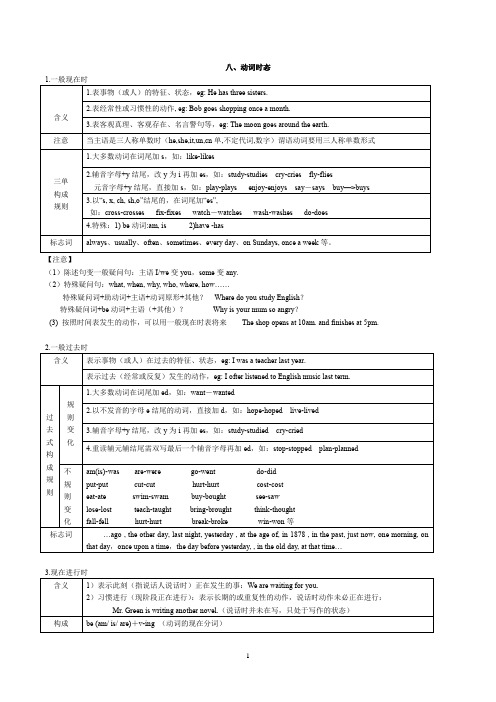
八、动词时态【注意】(1)陈述句变一般疑问句:主语I/we变you,some变any.(2)特殊疑问句:what, when, why, who, where, how……特殊疑问词+助动词+主语+动词原形+其他?Where do you study English?特殊疑问词+be动词+主语(+其他)?Why is your mum so angry?(3) 按照时间表发生的动作,可以用一般现在时表将来The shop opens at 10am. and finishes at 5pm.【注意】(1)always也可用于现在进行时,表示一种强烈的感情色彩,译为“总是”He is always telling lies.(2)某些特殊动词不能用于现在进行时。
① have当“有”讲时,不能用现在进行时。
I have two books now.②“belong to” The two people belong to me now.③表示“心理活动/状态/感觉”的词I want a dog now.① be going to主要用于:主观判断(1)表示事先经过考虑、安排好打算要做的事情:I’m going to play the violin.(2)表示根据目前某种迹象判断,某事非常有可能发生(有迹象表明要发生的事)。
Look!There come the dark clouds. It is going to rain.② will主要用于:(1)客观上将来势必发生的事情, 未经事先考虑, 临时决定的They will go to visit the factory tomorrow.(2)表示不以人的意志为转移的自然发展的未来的事:Today is Saturday. Tomorrow will be Sunday.(3)表意愿。
问对方是否愿意做某事或表示客气地邀请或命令:Will you please turn on the radio?(1) have/has been to “去过已回”She has been to Japan twice.have/has gone to. “去了未回”Where is your twin sister? She has gone to Japan.have/has been in “待在某地” She has been in Japan for 2 years. (2) 动词从词义上可以分为延续性和非延续性两种。
中考英语时态全解之一般现在时(附中考真题检测题及答案)

中考英语时态全解之一般现在时(附中考真题检测题及答案)During the middle school stage。
students mainly learn and use the following tenses: present simple。
present continuous。
past simple。
past continuous。
present perfect。
present perfect continuous。
past perfect。
simple future。
and future perfect。
Present Simple XXXThis n includes a grammar n。
past exam ns。
practice exercises。
and exam drills。
The structure of this tense is the base form of the verb "do" or the third person singular form "does" (used when the subject is singular and in the third person)。
To form negative and interrogative sentences。
we need to use auxiliary verbs:1.In general:Affirmative sentence: I often play computer games every day.Negative sentence: I don't play computer games。
= I never play computer games.Interrogative sentence: Do you play computer games。
中考英语语法“一般现在时”讲解
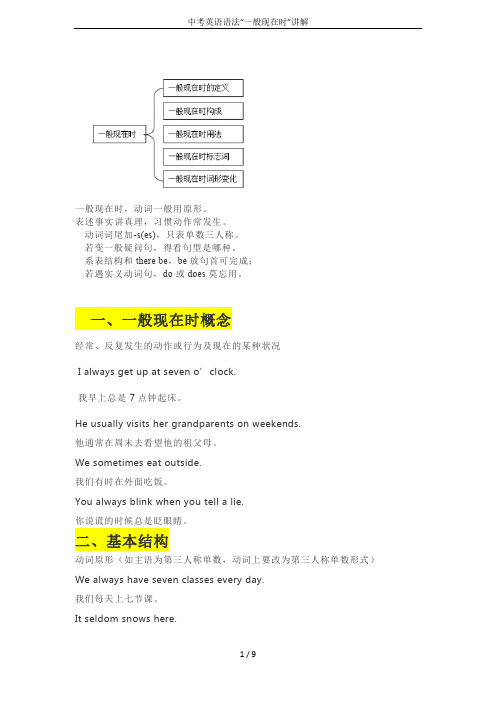
一般现在时,动词一般用原形。
表述事实讲真理,习惯动作常发生。
动词词尾加-s(es),只表单数三人称。
若变一般疑问句,得看句型是哪种。
系表结构和there be,be放句首可完成;若遇实义动词句,do或does莫忘用。
一、一般现在时概念经常、反复发生的动作或行为及现在的某种状况I always get up at seven o’clock.我早上总是7点钟起床。
He usually visits her grandparents on weekends.他通常在周末去看望他的祖父母。
We sometimes eat outside.我们有时在外面吃饭。
You always blink when you tell a lie.你说谎的时候总是眨眼睛。
二、基本结构动词原形(如主语为第三人称单数,动词上要改为第三人称单数形式)We always have seven classes every day.我们每天上七节课。
It seldom snows here.这很少下雪He is always ready to help others.他随时准备帮助其他人。
Action speaks louder than words.行动胜于空谈。
否定形式:am/is/ are+ not;此时态的谓语动词若为行为动词,则在其前加dont,如主语为第三人称单数,则用doesnt,同时还原行为动词He is always ready to help others.变成否定句:He isn’t always ready to help others.We always have seven classes every day.变成否定句:We don’t always have seven classes every day.He usually visits his grandparents on weekends.变成否定句:He doesn’t usually visit his grandparents on weeks.一般疑问句:把be动词放于句首;用助动词do提问,如主语为第三人称单数,则用does,同时,还原行为动词。
专题11一般现在时(讲义与练习)2024年中考英语一轮复习之语法
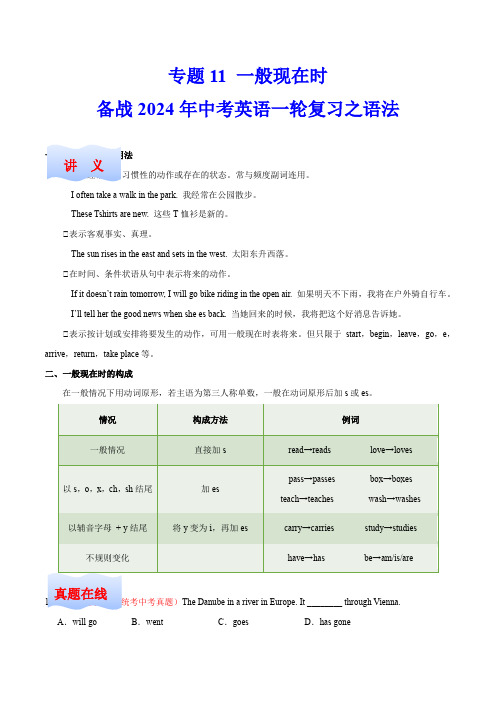
专题11 一般现在时备战2024年中考英语一轮复习之语法一、一般现在时的用法讲义①表示经常性、习惯性的动作或存在的状态。
常与频度副词连用。
I often take a walk in the park. 我经常在公园散步。
These Tshirts are new. 这些T恤衫是新的。
①表示客观事实、真理。
The sun rises in the east and sets in the west. 太阳东升西落。
①在时间、条件状语从句中表示将来的动作。
If it doesn’t rain tomorrow, I will go bike riding in the open air. 如果明天不下雨,我将在户外骑自行车。
I’ll tell her the good news when she es back. 当她回来的时候,我将把这个好消息告诉她。
①表示按计划或安排将要发生的动作,可用一般现在时表将来。
但只限于start,begin,leave,go,e,arrive,return,take place等。
二、一般现在时的构成在一般情况下用动词原形,若主语为第三人称单数,一般在动词原形后加s或es。
【答案】C【详解】句意:多瑙河是欧洲的一条河流。
它经过维也纳。
考查时态。
根据“The Danube in a river in Europe. It...through Vienna.”可知,此处陈述客观事实,用一般现在时,主语是It,谓语动词用单三形式,故选C。
2.(2023·江苏镇江·统考中考真题)There ________ many modern highspeed railways in Jiangsu and they help people travel easily.A.is B.are C.was D.were【答案】B【详解】句意:江苏有许多现代化的高速铁路,它们帮助人们方便地出行。
初中英语语法一般现在时、将来时、过去时讲解及练习题
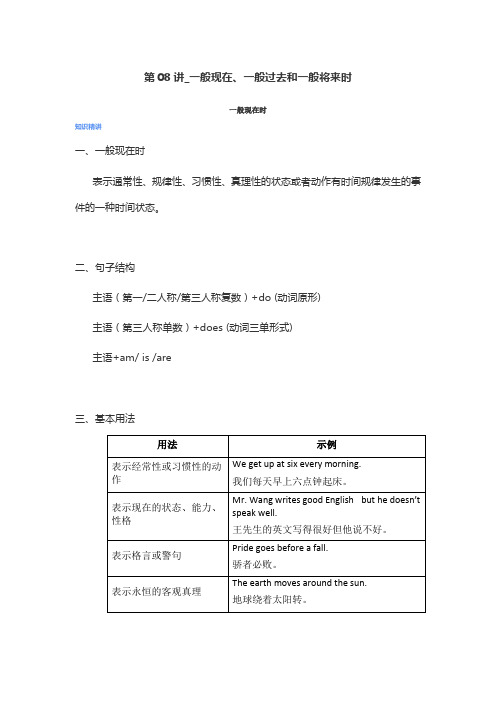
一般现在时知识精讲一、一般现在时表示通常性、规律性、习惯性、真理性的状态或者动作有时间规律发生的事件的一种时间状态。
二、句子结构主语(第一/二人称/第三人称复数)+do (动词原形)主语(第三人称单数)+does (动词三单形式)主语+am/ is /are三、基本用法四、时间状语1. 表示频率的副词: always, usually, often, sometimes, never, hardly, seldom…2. every/once+名词: every day/ week/ year, once a week/ month …3. 表示时间的短语: twice a day, on weekends, on Mondays…五、一般现在时动词三单的变化规律六、相关句式三点剖析一、考点:时态是英语学习中的核心内容之一,是英语学习的基础。
自然,时态考查是各种英语考试尤其是中考时的座上宾。
动作发生的时间决定时态,时态决定动词的形式,而考卷中的时态题通常没有给出明确的时间标志词,考试需领悟所提供的语境来做出判断。
只有推断出动作发出的正确时间,才可能正确答题,这就要求考生在熟练掌握时态结构、用法并牢记常用的时间状语的基础上,要充分利用上下文中隐含的信息来捕捉时间,找准答题的突破口。
二、重难点:一般现在时在考试中的重难点是:句子结构、基本用法、标志时间状语、动词三单的变化规则及相关句式的变化。
三、补充点:1. 表示按计划或安排好的,或将要发生的动作,可用一般现在时表将来。
但只限于start, begin, leave, go, come, arrive, return, take place等。
例:My train leaves at 7:00 this afternoon.我乘坐的火车将在今天下午7点离开。
2. 在复合句中,当主句是一般将来时,时间或条件状语从句的谓语动词只能用一般现在时来表示将来要发生的动作。
中考初中英语语法八大时态总结(附答案)
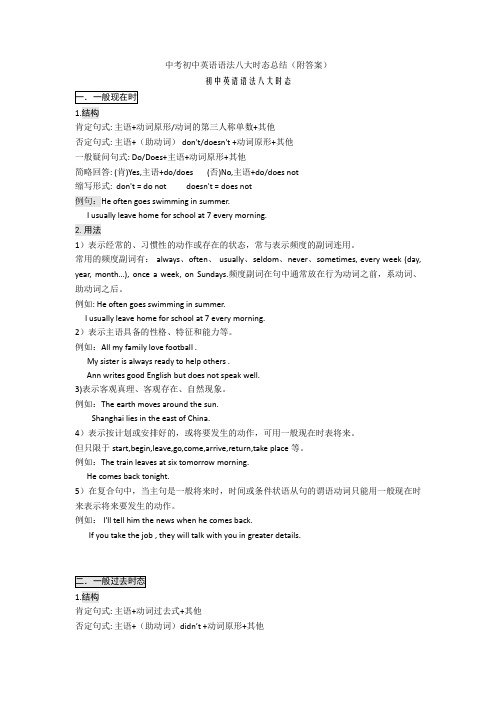
中考初中英语语法八大时态总结(附答案)初中英语语法八大时态1.结构肯定句式: 主语+动词原形/动词的第三人称单数+其他否定句式: 主语+(助动词) don't/doesn't +动词原形+其他一般疑问句式: Do/Does+主语+动词原形+其他简略回答: (肯)Yes,主语+do/does (否)No,主语+do/does not缩写形式: don't = do not doesn't = does not例句:He often goes swimming in summer.I usually leave home for school at 7 every morning.2.用法1)表示经常的、习惯性的动作或存在的状态,常与表示频度的副词连用。
常用的频度副词有: always、often、 usually、seldom、never、sometimes, every week (day, year, month…), once a week, on Sundays.频度副词在句中通常放在行为动词之前,系动词、助动词之后。
例如: He often goes swimming in summer.I usually leave home for school at 7 every morning.2)表示主语具备的性格、特征和能力等。
例如:All my family love football .My sister is always ready to help others .Ann writes good English but does not speak well.3)表示客观真理、客观存在、自然现象。
例如:The earth moves around the sun.Shanghai lies in the east of China.4)表示按计划或安排好的,或将要发生的动作,可用一般现在时表将来。
中考英语语法行为动词的一般现在时复习讲义及用法总结

中考英语语法行为动词的一般现在时复习讲义及用法总结行为动词的一般现在时除了be动词(am,is,are)、助动词、情态动词以外的动词全部称为行为动词。
在行为动词的句型中,主语为第三人称单数时的动词变化要特别注意(构成参见(第9章动词概说))。
行为动词一般现在时的否定句和一般疑问句要加do/does,这和be动词是不同的。
1.行为动词一般现在时的肯定句I play baseball every Sunday.(我每个星期日都打棒球。
)She usually does her homework at school.(她通常在学校做作业。
)(1)主语为第一、二人称或第三人称复数时主语为第一人称I/we、第二人称you或第三人称复数时,谓语动词没有形式的变化。
句型:主语(除第三人称单数外)+行为动词(原形)+……I go to school every day.(我每天去上学。
)We have three children.(我们有三个孩子。
)You sing very well.(你(们)唱得很棒。
)They live far from school.(他们住得离学校远。
)(2)主语为第三人称单数时主语为第三人称单数时,谓语动词的一般现在时形式有变化,变化规律和名词的单数变复数形式相同。
句型:主语(第三人称单数)+行为动词(-s/-es)+……He always wears (in) black.(他总是穿黑色的衣服。
)She often gets up at half past six.(她经常六点半起床。
)Who(主语)looks after(谓语)the baby?(谁照看这个婴儿?)(2)特殊疑问句的回答特殊疑问句不能用yes/no回答。
由于在问句中出现do/does,所以动词保持原形,但回答时,动词要视主语而决定是否加-s等。
A:Where does her father work?(她父亲在哪儿工作?)B:He works in an iron factory.(他在一家铁制品厂工作。
【中考英语复习之语法过关(牛津译林版)】课时05 谓语动词的时态 语态和主谓一致(学生版)

第五课时谓语动词的时态、语态和主谓一致动词时态历来是中考考查的重点。
动词时态考查虽多,但考向非常集中,最常考的是一般过去时和一般现在时,其次是现在完成时,其他时态考查相对较少。
因此备考重点是:①动词时态的基本用法①动词语态的基本用法①主谓一致(1)一般现在时①表示经常或习惯性的动作,多用动作动词,且常与表频率的时间状语连用。
We have meals three times a day.我们一日吃三餐。
①表示客观真理、科学事实及自然现象。
The sun sets in the west.太阳从西方落下。
①在时间、条件状语从句中常用一般现在时代替一般将来时。
I’ll write to her when I have time.有时间我会写信给她。
(2)一般过去时①表示过去发生的一次性或习惯性动作或状态。
We often played basketball together.我们(过去)经常在一起打篮球。
①时间、条件、让步状语从句中,若主句用了过去将来时,从句常用一般过去时。
He said he would tell her the news as soon as he met her.他说他一见到她就把这个消息告诉她。
(3)一般将来时①“will/shall+动词原形”表示将来某一时刻的动作或状态,即单纯的将来事实。
I shall call you as soon as I arrive.我一到就给你打电话。
They will probably go to Shanghai for their holiday.他们可能去上海度假。
①一般将来时的常用结构If you ask him, he will help you.如果你请他帮忙,他会帮助你的。
①表示一般将来时的特殊结构Look at the dark clouds.It is going to rain.看这些乌云,要下雨了。
When are you to leave/leaving for home?你什么时候回家?1.Before the sun, we need to get to the top of the mountain.A.setB.setsC.is settingD.will set2.—I don't know when he the airport tomorrow. If I get his flight number, I will let you know.—OK. Thank you.A.reachedB.will reachC.was reachingD.reaches3.—What did our geography teacher say?—She told us that the earth around the sun.A.movesB.movedC.has movedD.was moving4.—Guess what!I met Mrs. Brown in Tokyo!—Really?I she was writing a new book in her home in New York.A.will thinkB.thinkC.am thinkingD.thought5.—Don't drink wine, George. You home after the party.—OK, I won't. Thanks for your reminding.A.driveB.droveC.will driveD.have driven6.—you to ride a motorbike?—Yes. But last month I sold it and bought a car.A.Did;useB.Are;usedC.Do;useD.Did;used2.进行时态(1)现在进行时(am/is/are+现在分词)①表示说话时正在进行或发生的动作,也可表示现阶段正在进行的动作或存在的状态。
初中英语语法动词八种时态详解
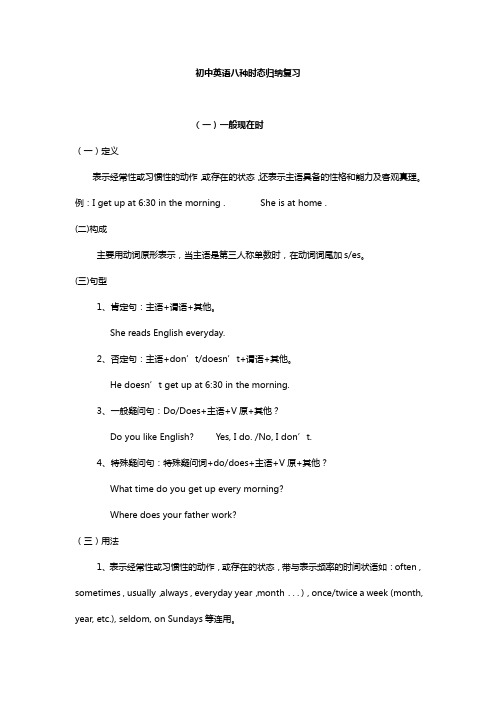
初中英语八种时态归纳复习(一)一般现在时(一)定义表示经常性或习惯性的动作,或存在的状态,还表示主语具备的性格和能力及客观真理。
例:I get up at 6:30 in the morning . She is at home .(二)构成主要用动词原形表示,当主语是第三人称单数时,在动词词尾加s/es。
(三)句型1、肯定句:主语+谓语+其他。
She reads English everyday.2、否定句:主语+don’t/doesn’t+谓语+其他。
He doesn’t get up at 6:30 in the morning.3、一般疑问句:Do/Does+主语+V原+其他?Do you like English? Yes, I do. /No, I don’t.4、特殊疑问句:特殊疑问词+do/does+主语+V原+其他?What time do you get up every morning?Where does your father work?(三)用法1、表示经常性或习惯性的动作,或存在的状态,带与表示频率的时间状语如:often , sometimes , usually,always , everyday year,month...), once/twice a week (month, year, etc.), seldom, on Sundays等连用。
I leave home for school at seven every morning.2、表示客观真理,科学事实、格言警句。
The sun rises in the east .日出东方。
The earth goes around the sun .地球绕着太阳转。
Ten minus two is eight.十减二等于八。
Light travels faster than sound .光的速度比声音的速度快。
初中英语2024届中考语法复习动词时态知识讲解

中考英语语法复习动词时态知识讲解一、时态定义* 时态是英语谓语动词的一种形式,表示动作发生的时间和所处的状态。
* 英语中的时态是通过动词形式本身的变化来实现的。
英语中主要有十六种时态,在初中英语阶段主要掌握六种时态:一般现在时、现在进行时、一般将来时、一般过去时、过去进行时以及现在完成时。
二、一般现在时(一)一般现在时用法:1.一般现在时表示习惯性的动作、讲话时人或物的特性或状态。
Eg: I go to school on foot every day.我每天走路上学She has a cute dog.她又一只可爱的狗。
2.表示自然现象或客观真理时Eg: Light travels more quickly than sound.光的传播速度比声音快。
The Earth goes around the Sun.地球绕着太阳转。
3.在if引导的条件状语从句中,从句用一般现在时Eg: If it rains tomorrow, I will stay at home.如果明天下雨我就呆在家里。
(二)一般现在时的结构1.结构:肯定式:主语 + 谓语动词 + 其它否定式:主语 + don't + 谓语动词 + 其它一般疑问句:Do + 主语 + 谓语动词 + 其它特殊疑问句:特殊疑问词 + 一般疑问句注意:当主语是第三人称单数时,谓语动词要用三单形式,助动词do要变为does。
Eg: 肯定句: I work in Beijing.我在北京工作。
She works in Beijing.她在北京工作。
否定句:I don’t work in Beijing.我不在北京工作。
She doesn’t work in Bejing.她不在北京工作。
一般疑问句:Do you work in Bejing?你在北京工作吗?Does she work in Beijing?她在北京工作吗?特殊疑问句: Where do you work?你在哪工作?Where does she work?她在哪工作?2.动词三单形式变化规则(1)一般情况下直接加-s;Eg: cook -- cooks; work -- works(2)以s, x, ch, sh, o结尾的动词加-es;Eg: catch -- catches; go -- goes; do -- does(3)以辅音加y结尾,将y变成i再加-es;Eg: study -- studies; try -- tries(4)特殊变化:have -- has(三)一般现在时时间标志词一般现在时常与every day, often, usually, always, seldom, sometimes等时间状语连用。
英语人教版九年级全册语法复习之时态

8. 7. – What has happened to the fish, Mary?
9. -- Mum, the chaat s__e_a_te_n_ (eat) the fish. Just now
the jcuamt _p_e_d__(jump) onto the table anadte_____(eat)
动词时态
初中阶段8种时态: 1.一般现在时 2.一般过去时 3.一般将来时 4.现在进行时 5.过去进行时 6.现在完成时 7.过去完成时 8.过去将来时
(1) 一般现在时:
1.表示经常反复发生的动作.
2. e.g. They often spend their holidays in
the south.
5. -- ___Is_ my son __w_o_r_k_in_g___ (work) hard this term?
6. -- Oh, yes, he _is__tr_y_i_n_g__(try) his best now.
7. 6. D__o_e_s__ the hatfi_t______ (fit) me well?
it up. lived
10.8. Sam ____( live) in the small town fhoarvfievegryoewanrs
during the war.
saw
11.9. It is ages since I last ____(see) you. You
___(grow) taller.
进行)的动作: 4. e.g. We are writing a paper these days.
一般现在时与现在进行时的区别
1.进行时强调动作正在进行,而现在时强调动作的
中考英语时态复习:一般现在时(知识点总结、练习 无答案)
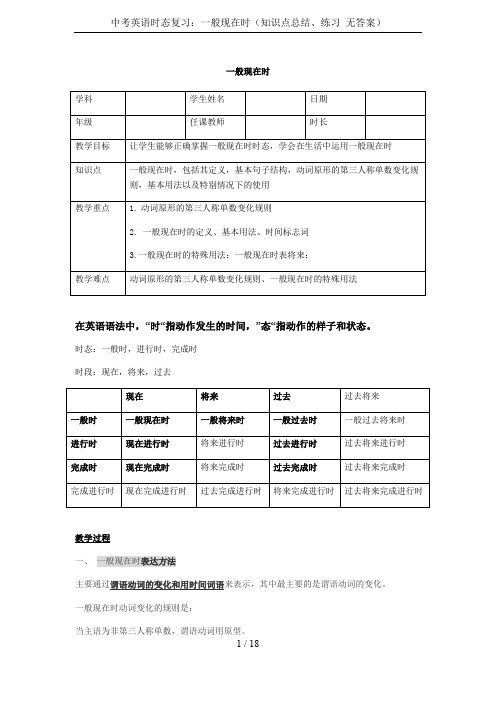
一般现在时在英语语法中,“时“指动作发生的时间,”态“指动作的样子和状态。
时态:一般时,进行时,完成时时段:现在,将来,过去教学过程一、一般现在时表达方法主要通过谓语动词的变化和用时间词语来表示,其中最主要的是谓语动词的变化。
一般现在时动词变化的规则是:当主语为非第三人称单数,谓语动词用原型。
当主语为第三人称单数,谓语动词用第三人称单数形式。
e.g.1. We often get up early in the morning.2. My father often gets up early in the morning.二、英语中第三人称在一般现在时中,当主语是第三人称单数时,谓语动词要用第三人称单数形式,即写一写:watch ________ arrive ________ grow ________match ________ let ________ make ________stay ________ try ________ pass ________study ________ have ________三、第三人称有哪些?用一句话概括:“非你、非我、非复数”如he, she, it, my father, my mother, my sister, our English teacher, Tom, Mike, Liu Jia, China, my book, etc.一、人称代词he, she, it是第三人称单数。
如:He likes watching TV. 他喜欢看电视。
She has lunch at twelve. 她十二点吃午餐。
It looks like a cat. 它看起来像只猫。
二、单个人名、地名或称呼作主语;是第三人称单数。
如:①Han Mei looks like her mother.韩梅看起来像她的母亲。
②Beijing is in China.北京在中国。
九年级中考英语语法知识梳理-一般现在时
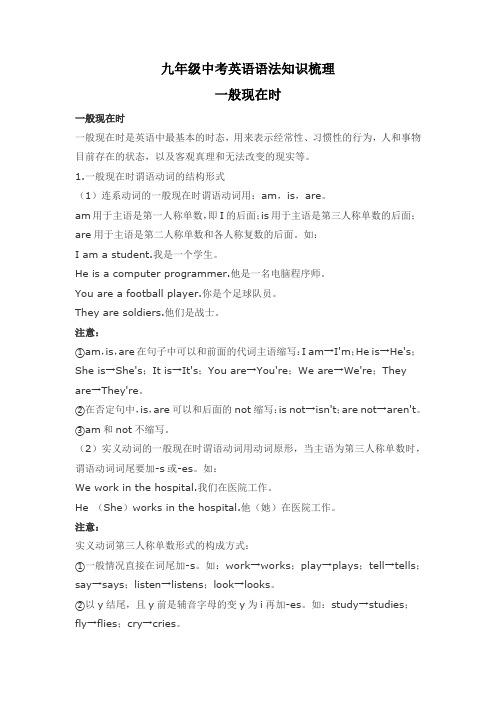
九年级中考英语语法知识梳理一般现在时一般现在时一般现在时是英语中最基本的时态,用来表示经常性、习惯性的行为,人和事物目前存在的状态,以及客观真理和无法改变的现实等。
1.一般现在时谓语动词的结构形式(1)连系动词的一般现在时谓语动词用:am,is,are。
am用于主语是第一人称单数,即I的后面;is用于主语是第三人称单数的后面;are用于主语是第二人称单数和各人称复数的后面。
如:I am a student.我是一个学生。
He is a computer programmer.他是一名电脑程序师。
You are a football player.你是个足球队员。
They are soldiers.他们是战士。
注意:①am,is,are在句子中可以和前面的代词主语缩写:I am→I'm;He is→He's;She is→She's;It is→It's;You are→You're;We are→We're;They are→They're。
②在否定句中,is,are可以和后面的not缩写:is not→isn't;are not→aren't。
③am和not不缩写。
(2)实义动词的一般现在时谓语动词用动词原形,当主语为第三人称单数时,谓语动词词尾要加-s或-es。
如:We work in the hospital.我们在医院工作。
He (She)works in the hospital.他(她)在医院工作。
注意:实义动词第三人称单数形式的构成方式:①一般情况直接在词尾加-s。
如:work→works;play→plays;tell→tells;say→says;listen→listens;look→looks。
②以y结尾,且y前是辅音字母的变y为i再加-es。
如:study→studies;fly→flies;cry→cries。
- 1、下载文档前请自行甄别文档内容的完整性,平台不提供额外的编辑、内容补充、找答案等附加服务。
- 2、"仅部分预览"的文档,不可在线预览部分如存在完整性等问题,可反馈申请退款(可完整预览的文档不适用该条件!)。
- 3、如文档侵犯您的权益,请联系客服反馈,我们会尽快为您处理(人工客服工作时间:9:00-18:30)。
中考英语时态复习:一般现在时
一般现在时是英语中应用最广泛的时态之一,是中考复习的重点。
它表示
1)经常性、习惯性的动作或存在的状态。
e.g. I go to school on foot. He is very busy now.
2)表示主语的特征、性格、能力、爱好等。
e.g. He can swim. I work hard. I like watching TV.
3)表示客观真理 e.g. There are seven days in a week. The moon moves round the earth.
其结构按正常语序,即“主语+谓语+其它”,有时为了起强调作用,时间状语也可提前.
其句式变化可分为两种情况
1)表示动作,一般人称作主语的,变否定句须在动词前加助动词don’t;变一般疑问句须在句首加助动词do。
E.g. They have lunch at 12:00. They don’t have lunch at 12:00. Do they have lunch at 12:00?
2)单三人称做主语的,变否定句须在动词前加助动词doesn’t;变一般疑问句须在句首加助动词does。
E.g. Jenny speaks English very well.
Jenny doesn’t speak English very well.
Does Jenny speak English very well?
含有be动词的要在be上做变化.
E.g. Danny is a good student.
Danny isn’t a good student.
Is Danny a good student?
其时间状语为often、 usually、 always、 sometimes等频率副词,on Saturdays、 in the morning(afternoon evening) 、every day 等。
做题时常见错误如下:
一、be动词与行为动词同时出现在句子中
例:We are plant (plant) the trees in spring.
答案:plant
解析:学生往往会用汉语的思维方式去翻译,就成了“我们是在春天植树”。
这是学习英语最忌讳的,要看语法是不是正确,在英语中,be是表状态,do是表动作,两种动词不能同时出现在句子中,可记住如下口诀:“英汉语言有差异,be 、do不能放一起,仔细琢磨细分析,语法千万要牢记。
”
专项练习:
一、单选
1 Jenny ____ in an office. Her parents ____in a hospital.
A work works
B works work
C work are working
D is working work
2 One of the boys_____ a black hat.
A have
B there is
C there are
D has
3 We will go shopping if it____ tomorrow.
A don't rain Bdidn't rain Cdoesn't rain Disn't rain
4 He said the sun ____in the east and ____in the west.
A rose; set
B rises; sets
C rises, set
D rise; sets
5 Wang Mei ____ music and often ____ to music.
A like; listen
B likes; listens
C like; are listening
D liking ; listen
6 Jenny____ English every evening.
A has study
B studies
C study
D studied
答案:1 B 2D 3C 4B 5B 6B
二、填空
1 I can take Li Ming there when he _____ ( come) to visit.
2 _____your sister_____(know)English?
3Her home____ _____ ______(远离 )her school.
4The pot_____(not look) like yours very much.
5 Where _____you____(have)lunch every day?
6 Who_____(想要 )to go swimming?
7 ______she_____(do) the housework every day?
8 Jenny and Danny usually______(play) games in the afternoon .
答案:1 comes 2 Does know 3 is away from 4 doesn't look
5 do have
6 wants
7 does do
8 play
二、单三人称形式易出错
例:1 He plaies (play) football very well.
2 Danny gos (go) to school at 7:10.
答案:1 plays 2 goes
解析:1以辅音字母加y结尾的动词变单三人称形式才能把y换成i再加es;2与名词变复数不同,变单三人称形式以o结尾的词要加es.
三、在句式变换时易出错
例:1 Does Jenny has (has) a good friend?
2 Brian doesn’t lives (not live) in China.
答案:1 Does have 2 doesn’t live
解析:单三人称做主语的一般现在时做句式变化时,可记住如下口诀:“见助动,用原形”。
此口诀也可推广用于一般过去时态中。
e.g. He didn't go home yesterday.
四、对do的理解易出错
例:We don’t (not do) our homework in the afternoon.
答案:don’t do
解析:do是一个比较难理解的词,它有三个含义: a)是所有行为动词的总称;b)是助动词,无实义;c)是一个具体的行为动词“做,干”。
此句中给出的do指“做,干”,not 指把此句变为否定句,故须在do前加助动词don’t。
五、对主语的数判断有误
例:Li Ming with me are (be) in Beijing.
答案: is
解析:表面一看是“我和李明两个人在北京”,但with在此做伴随状语,不能做主语,故用is.
另外,宾语从句中,从句部分若是表示客观真理,不管主句是何时态,从句都要用一般现在时;在时间和条件状语从句中,主句表将来,从句要用一般现在时。
资料来源:回澜阁教育免费下载天天更新。
